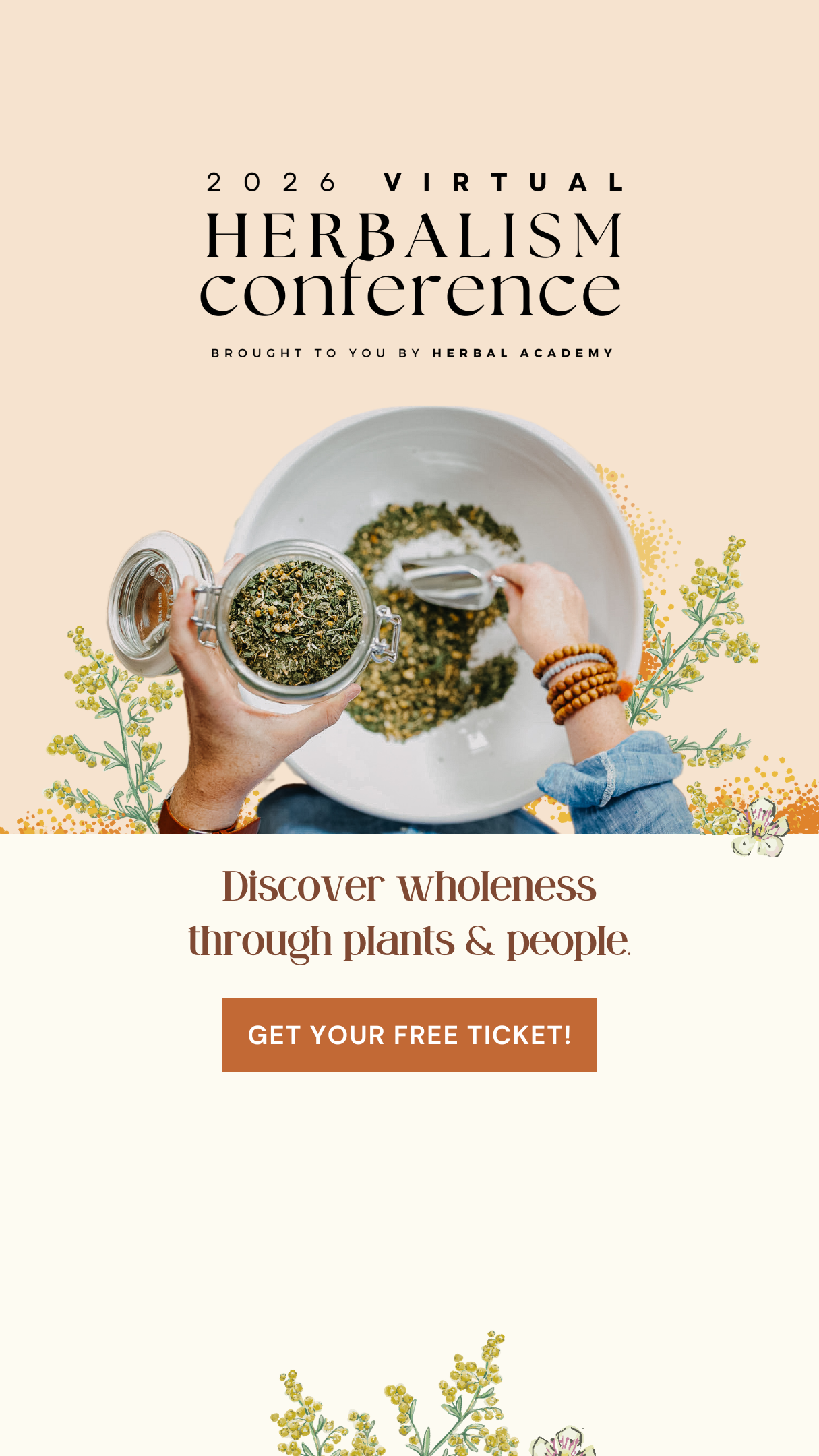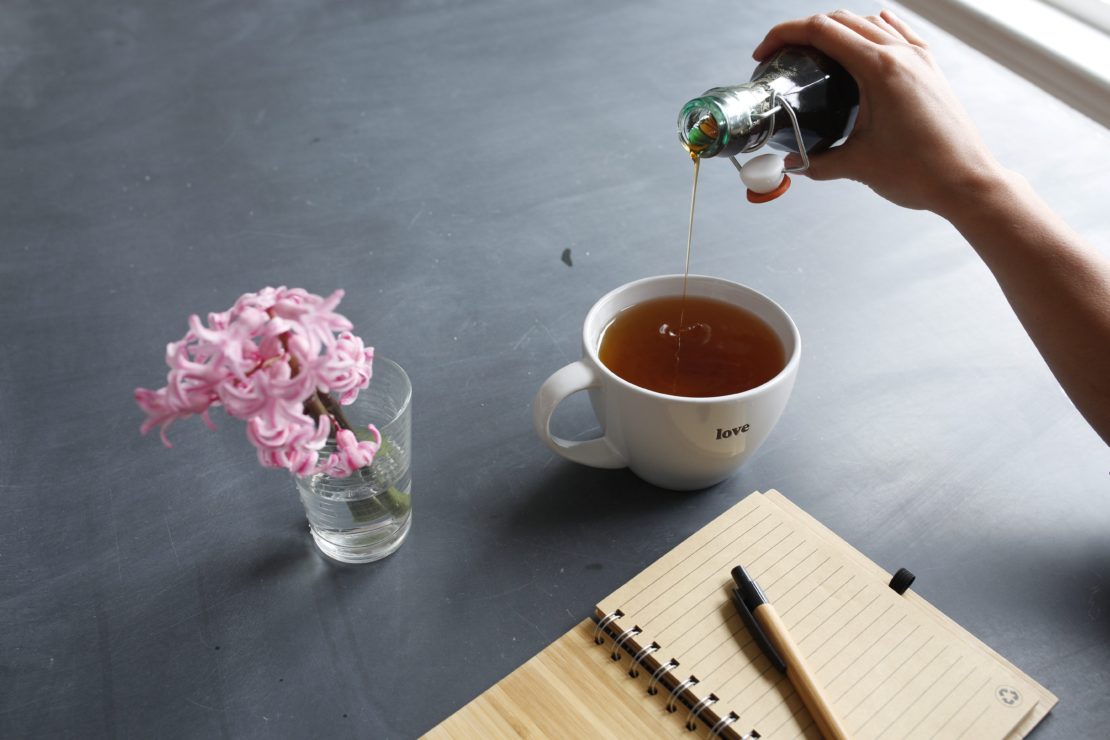
How To Make Vegan Herbal Syrups
Herbal syrups are a common herbal preparation. Not only are they easy to make and tasty to use, but they require minimal ingredients that can be found in most homes. Other than herbs, all that’s needed to make herbal syrups are water and some form of sweetener. Many herbalists prefer to use raw honey to sweeten their syrups, not only because it has a great flavor but because it adds its own health benefits to the syrup.
But what about herbalists who are vegan or those who choose not to use animal products? What do they use to make vegan herbal syrups?
Many vegans consider any product that comes from a bee to be off limits. When it comes to making homemade herbal syrups in which honey is commonly used, many vegans are looking for an alternative — a honey substitute.
If you’re a vegan and you’re interested in making vegan herbal syrups, you’ll find several alternatives to honey detailed in the article below.
But First, A Note On Sugar Consumption
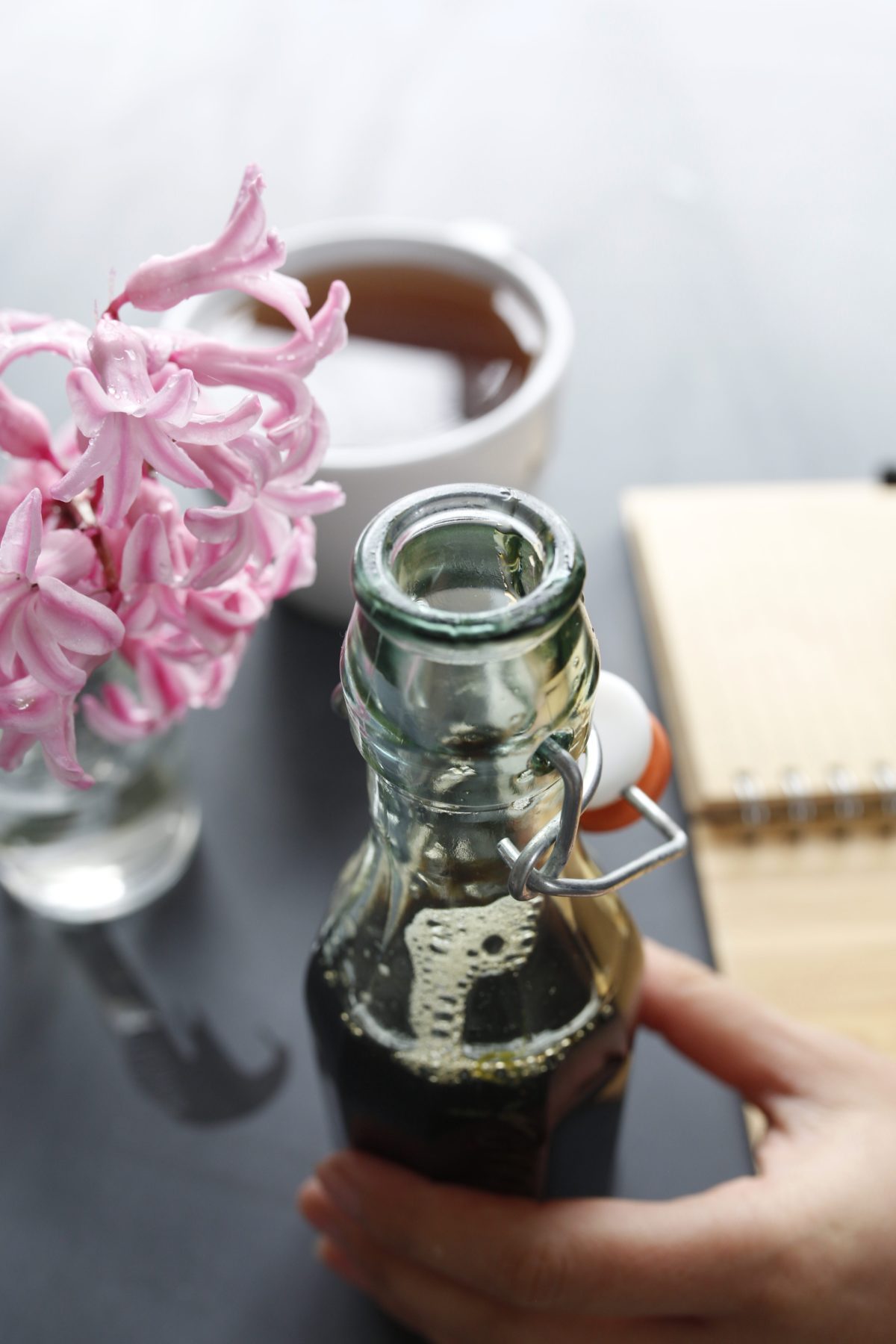
While researching honey alternatives for this article, I kept coming across repeated information about sugars and how they negatively impact one’s health. However, various types of sweeteners have been used for hundreds of years in herbal preparations without any report of negative effects on health.
While I’m not here to disagree with the fact that sugar is sugar and excess sugar consumption has a negative effect on the body — I would like to note that consuming sugars in herbal syrups is a bit different than consuming sugar from food sources simply due to quantity.
The American Heart Association (AHA) recommends no more than 6 teaspoons of added sugar per day for women, 9 teaspoons for men, and between 3-6 teaspoons (depending on age and caloric needs) for children (Johnson et al., 2009). The average dosage for most herbal syrups is a teaspoon or less for a 150-pound adult — less for children. While the majority of negative health effects from sugar stem from over-consumption or consuming sugars high in fructose, small doses of sugar from herbal preparations seem unlikely to impact one’s health in a negative way when used occasionally.
With that said, if you’re concerned about sugar’s negative effects on health, going with a sugar-substitute that is gentle on your blood glucose, gut, and liver and keeping your intake a low as possible is your best bet.
4 Honey Alternatives for Making Vegan Herbal Syrups
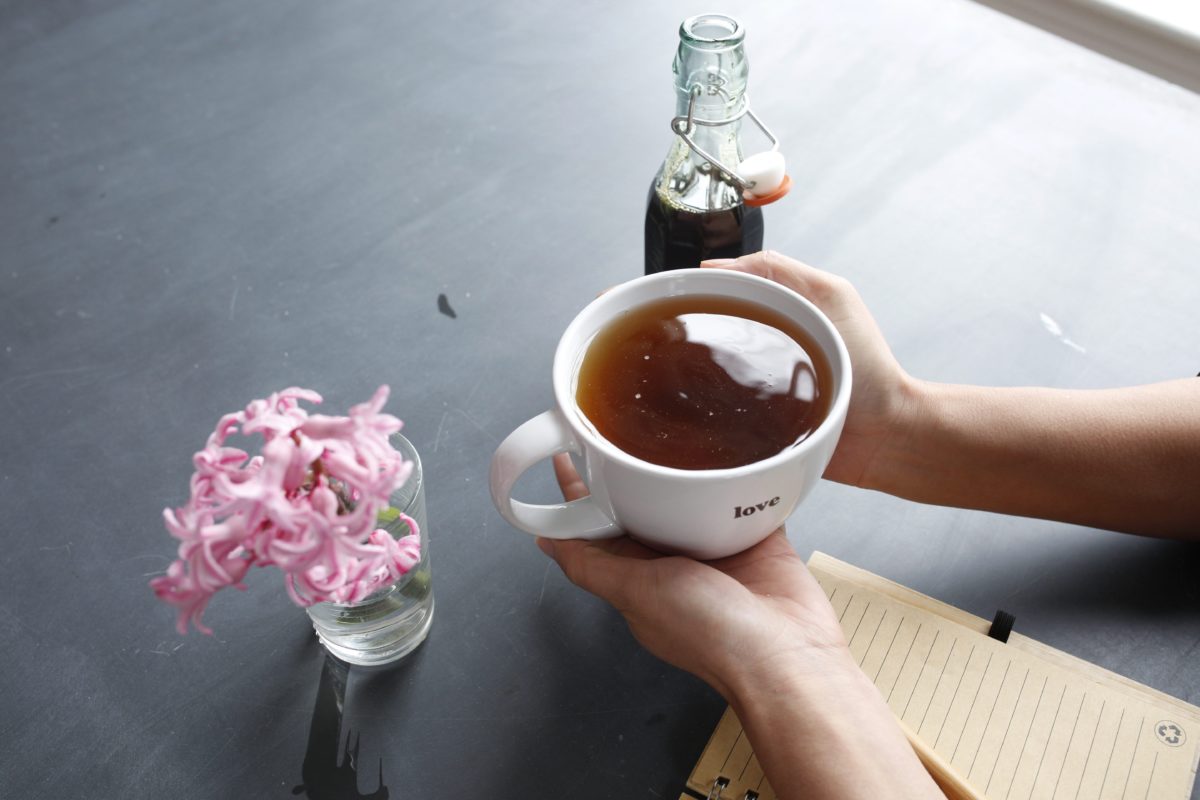
There are many alternatives for making traditional herbal syrups into vegan herbal syrups. Below, are several honey alternatives to consider, but keep in mind, this list is not comprehensive list by any means.
Keep in mind that the honey alternatives mentioned below vary in their degree of benefit to health so it’s important that you look into any you’re interested in using to make vegan herbal syrups more closely to see if it’s a good choice for you. Some of the sugars listed below contain nutrients; however, a large amount of these sweeteners must be eaten in order to obtain a significant amount of the nutrients. Obviously, this leads to too much sugar in the diet and isn’t recommended.
1. Vegetable-Sourced Glycerin
Glycerin is a thick liquid that is colorless and odorless. It is sweet to taste, soluble in water, and is metabolized in the liver (Lundquist, Tygstrup, Winkler, & Jensen, 1965), therefore, doesn’t cause insulin spikes like other sugars (carbohydrates) (Harvard School of Public Health, n.d.). While it doesn’t have significant health benefits, it also has minimal negative side effects, although large amounts of glycerin can increase fluid loss, leading to eventual dehydration (PubMed Health, 2018). Glycerin can replace honey in an herbal syrup at a ratio of 1:1. It’s typically extracted from plant or animal sources and is often used in food or skin care products. To use glycerin in vegan herbal syrups, be sure to purchase a vegetable-sourced glycerin that is certified non-GMO, as many vegetable-sourced glycerin products come from GMO foods.
2. Coconut Sugar
Coconut sugar (often called coconut nectar) is another honey substitute that can be used when making vegan herbal syrups. Coconut sugar comes from the sap of the coconut tree (like maple syrup comes from the sap of the maple tree). It contains 17 amino acids as well as a variety of minerals and vitamins B and C (Philippine Coconut Authority, n.d.). It has a low glycemic index and can easily replace honey at a ratio of 1:1.
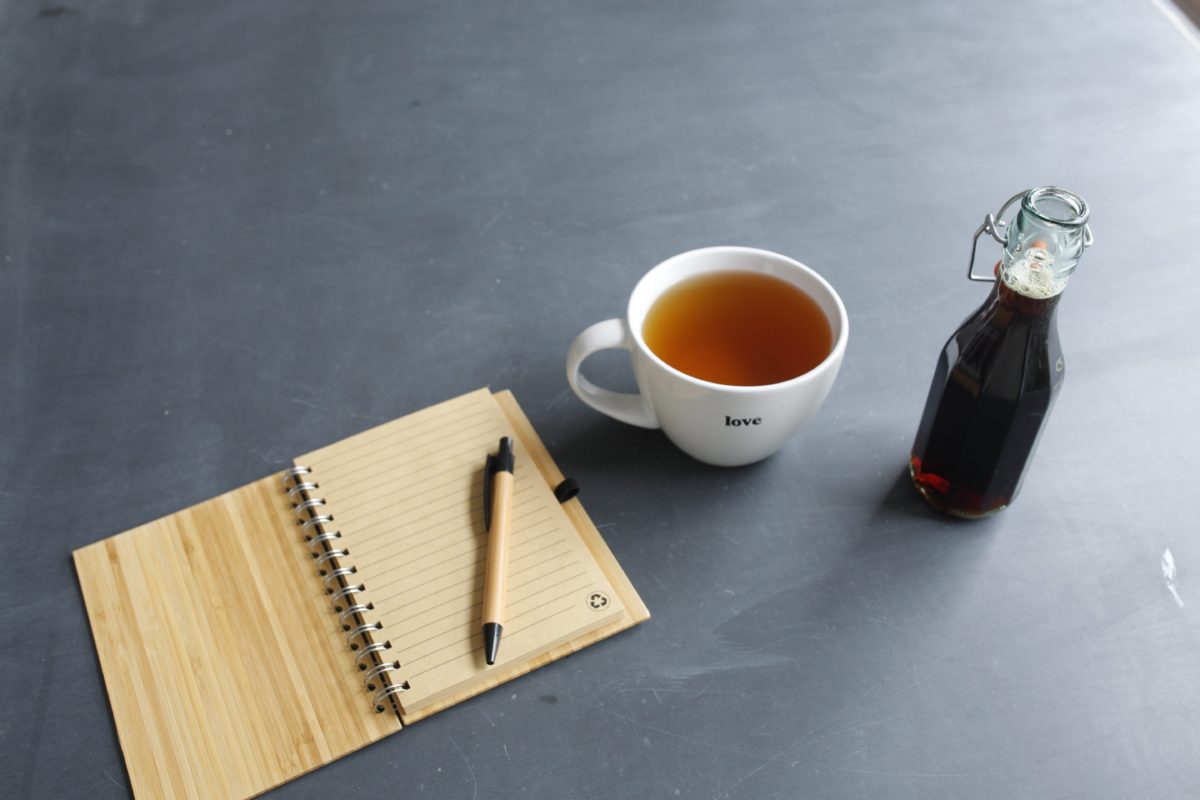
3. Stevia
Stevia (Stevia rebaudiana) is a plant whose leaves contain sweet glycoside compound called Rebaudioside A (Reb A) that are present fresh or dried (Gunnars, 2013). Stevia can be used as a honey substitute when making vegan herbal syrups, but it is a little trickier to use than some other options on this list. The most important thing is to pay attention to the type of stevia you are using. Stevia can come in raw, unprocessed form, powdered form, and extract form. Each of these are processed differently and can impact health in various ways, so be sure to research to find the form of stevia that is best for you. When using stevia as a honey substitute, it will contribute different tastes and dosages to your herbal syrup so you’ll need to experiment a bit to get your syrup tasting the way you want it. The end product will basically be a concentrated sweet tea. It will not be as thick as most syrups, and it will have to be refrigerated and used within 1-3 days as stevia doesn’t provide any preservation to the product like other sugars do.
4. Maple Syrup
Maple syrup is another honey substitute that can be used to make vegan herbal syrups. Maple syrup comes from the sap of maple trees and contains minerals, antioxidants, and even omega-6 fatty acids (SELFNutritionData, n.d.). While maple syrup is higher on the glycemic index than all of the other honey alternatives on this list, it’s still vegan and can replace honey at a ratio of 1:1.
Other Honey Alternatives

While the above four honey alternatives are not the only choices you have when making vegan herbal syrups, many of the other options I found such as monk fruit, brown rice syrup, and agave, while vegan, were less than ideal simply due to their high fructose content, which has a negative impact on the liver (University of California San Francisco, n.d.).
Each of these sweeteners will vary the taste of the end product as well as the syrup’s final consistency. Herbal syrups made using honey tend to be thicker, while many vegan herbal syrups are a bit thinner and runnier.
While some of these honey-alternatives for making vegan herbal syrups will vary in price, availability, and consistency, there are options to choose from based on your needs.
Finally
While herbal syrups are great ways to take mask the flavor of certain herbs, they do have their limitations. If larger amounts of an herb are needed for a particular issue in order to maintain blood sugar balance, an active immune system, and an overall positive impact on health, it may be better to change to a different type of preparation, such as an infusion or tincture, instead of consuming larger doses of herbal syrups.
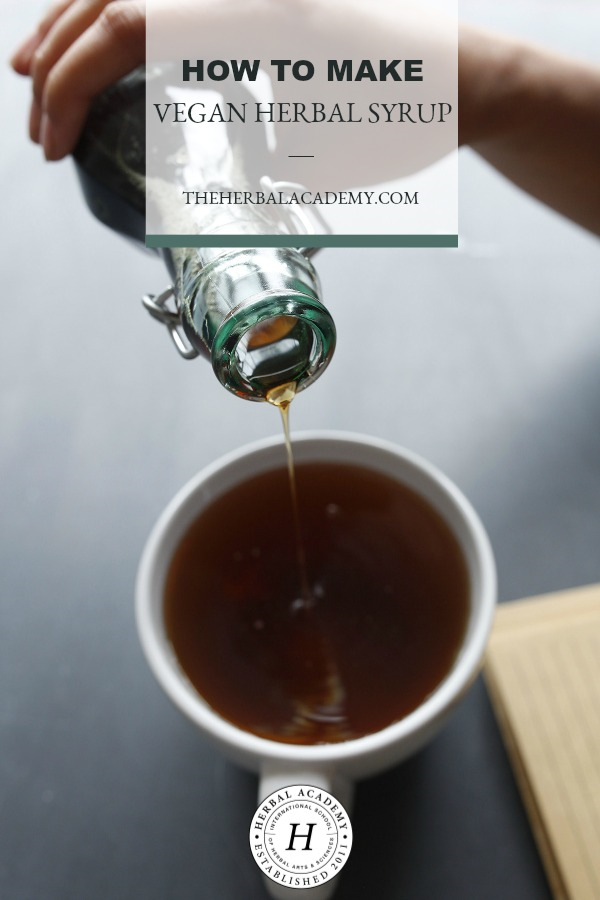
REFERENCES
Gunnars, K. (2013). 10 reasons why sugar is bad for you. [Online Article]. Retrieved from https://www.healthline.com/nutrition/10-disturbing-reasons-why-sugar-is-bad
Harvard School of Public Health. (n.d.). Carbohydrates and blood sugar. [Online Article]. Retrieved from https://www.hsph.harvard.edu/nutritionsource/carbohydrates/carbohydrates-and-blood-sugar/
Johnson, R.K., Appel, L., Brands, M., Howard, B., Lefevre, M., Lustig, R.,…Wyllie-Rosett, J. (2009). Dietary sugars intake and cardiovascular health: A scientific statement from the American Heart Association. Circulation, 120(11), 1011-20. doi:10.1161/CIRCULATIONAHA.109.192627. Retrieved from http://circ.ahajournals.org/content/circulationaha/120/11/1011.full.pdf
Lundquist F., Tygstrup N., Winkler K., & Jensen K.B. (1965). Glycerol metabolism in the human liver: inhibition by ethanol. [Abstract]. Science, 150(3696), 616-7. Retrieved from https://www.ncbi.nlm.nih.gov/pubmed/5837100
Philippine Coconut Authority. (n.d.). Technology description. [PDF]. Retrieved from http://www.pca.da.gov.ph/coconutrde/images/cfs16.pdf
PubMed Health. (2018). Micromedex Detailed Drug Information for the Consumer: Glycerin. [Internet]. Retrieved from https://www.ncbi.nlm.nih.gov/pubmedhealth/PMHT0010489/?report=details
SELFNutritionData. (n.d.). Syrup maple nutrition facts and calories. Retrieved from http://nutritiondata.self.com/facts/sweets/5602/2
University of California San Francisco. (n.d.). The toxic truth: Too much fructose can damage your liver, just like too much alcohol. [Online Article]. Retrieved from http://sugarscience.ucsf.edu/the-toxic-truth/#.Ws-MFiPMzuQ


